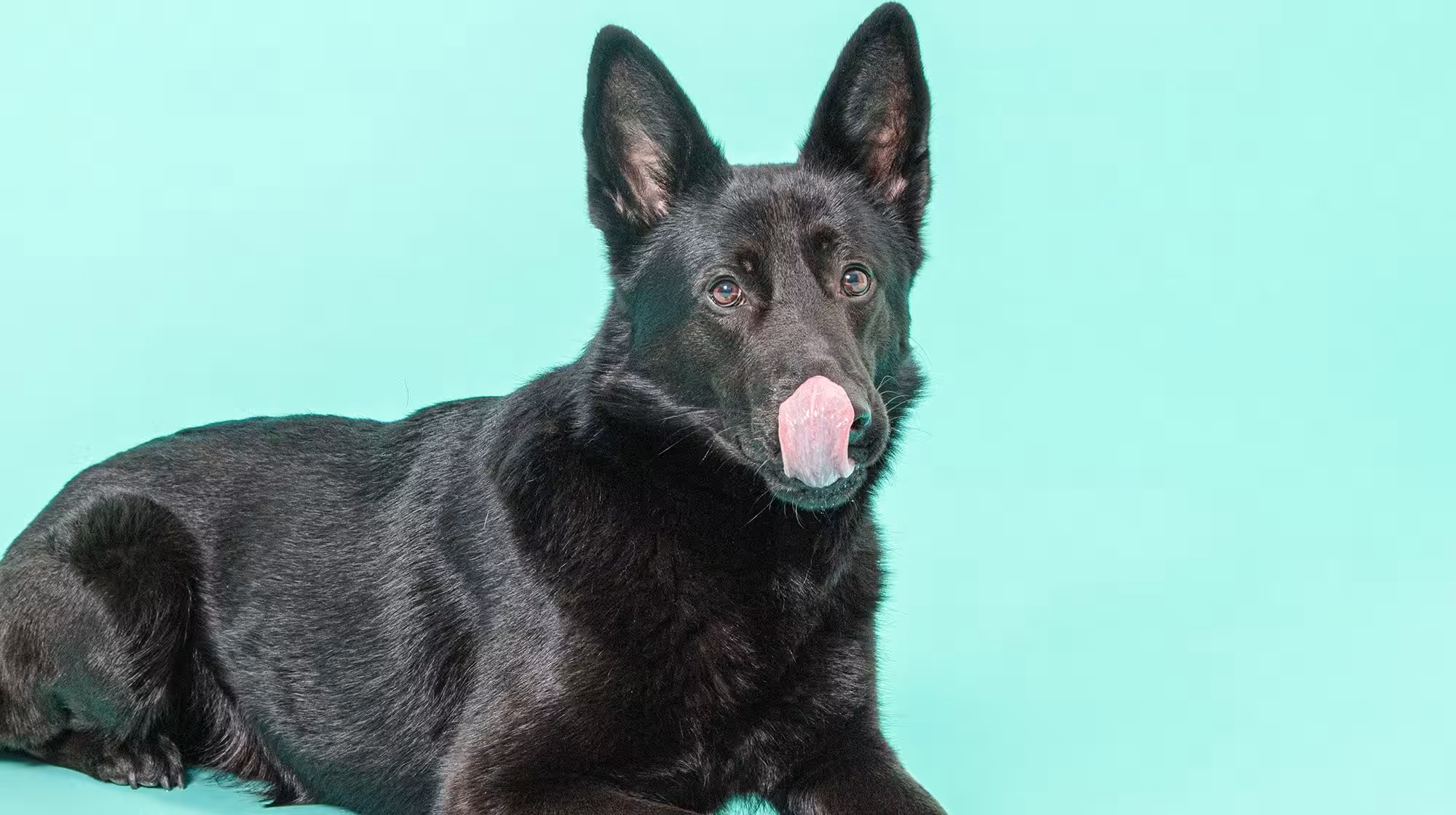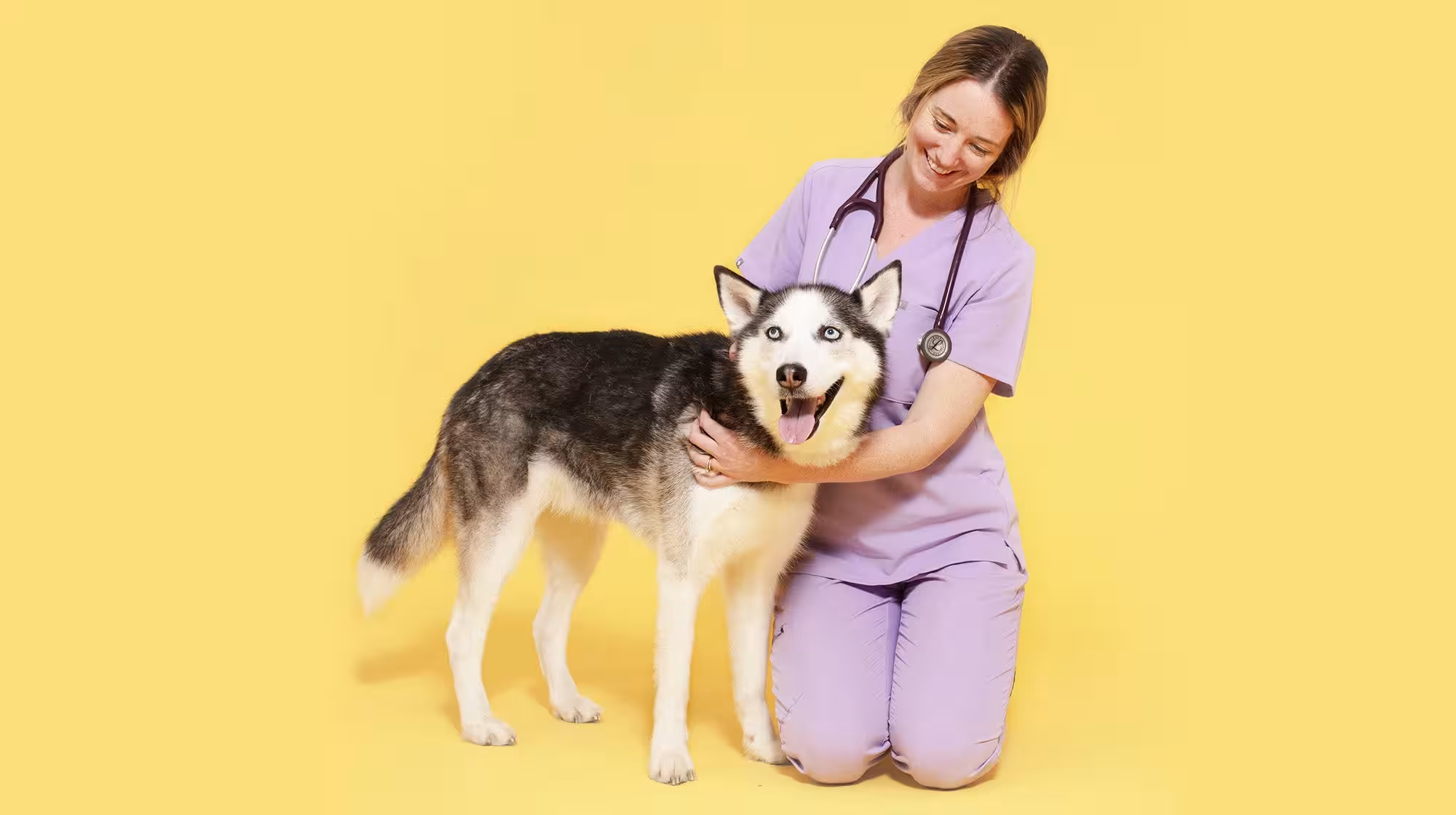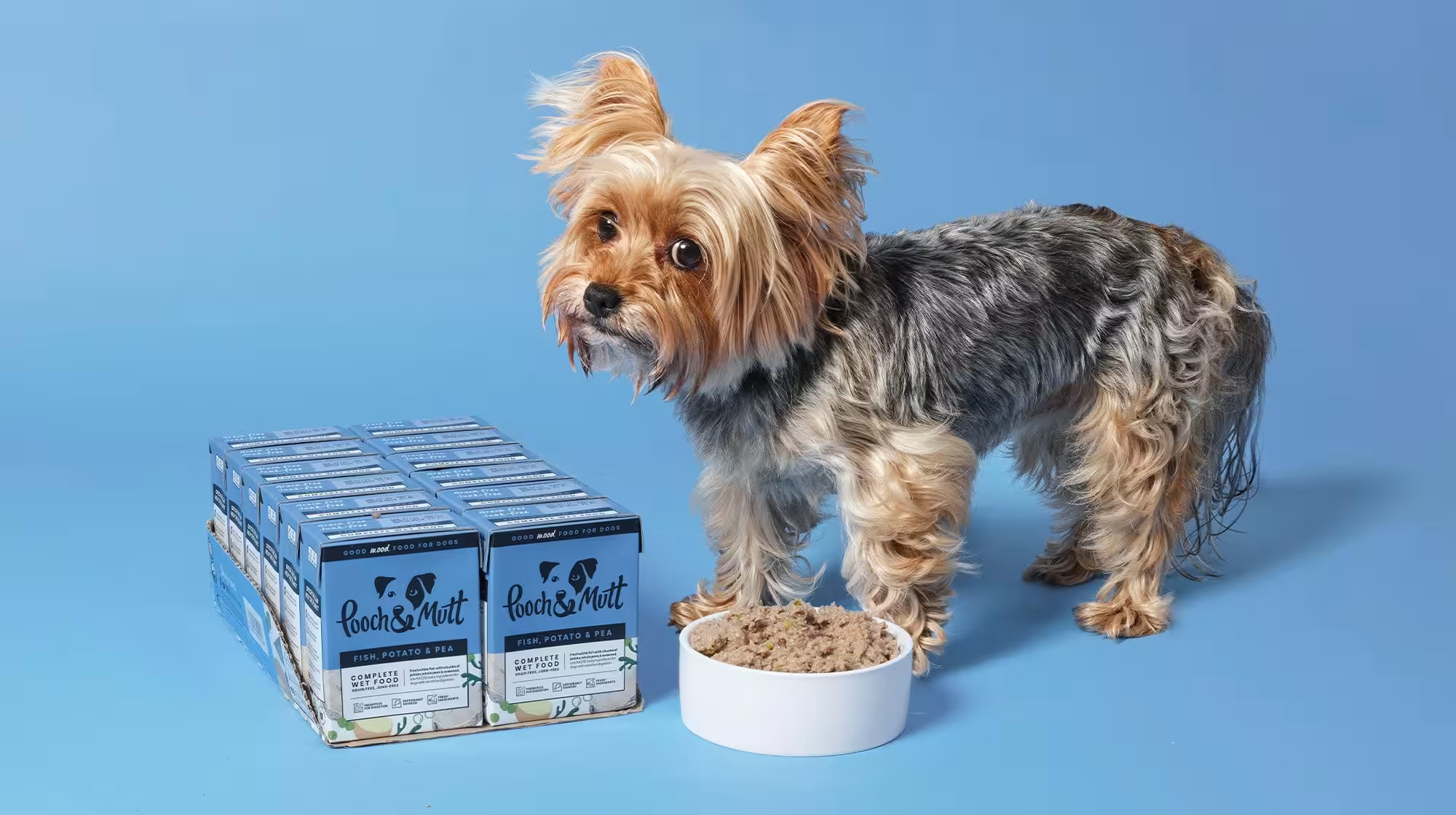Chicken is a favourite food of most dogs, and as it’s full of juicy protein, it often forms the main ingredient of many dog food recipes and treats. But it just so happens that chicken is also one of the most common food allergies in dogs!
With this in mind, managing a chicken allergy in your dog can be tricky. If you suspect your dog might have a chicken allergy, or you’re stumped on what to feed your allergic dog as a chicken alternative, join us as we unpack all you need to know about dogs with chicken allergies.
Could my dog have a chicken allergy?
Yes, believe it or not, some dogs are allergic to chicken!
Even if they like it, and eat it without hesitation, they could still have an allergy to chicken.
Chicken usually forms a large part of a dog’s diet (as it’s a nutritious, lean protein and tasty, too) - but it’s also one of the most common food allergies in dogs, alongside beef, wheat, eggs and dairy.

How common are chicken allergies in dogs?
Exact stats are hard to pin down, but chicken is known as one of the top food allergies in dogs, alongside beef and dairy.
This is because chicken is so widely used in a range of dog food, so more dogs are exposed to chicken; and also because the more often a dog eats a particular protein, the more likely it is that a dog will develop an allergy or intolerance to that food.
How do I know my dog has a chicken allergy?
As we’ve said, dogs will happily eat chicken even if they have an allergy, so it’s hard to diagnose from the get-go.
When getting advice from a vet, they’ll probably encourage you to do a trial-and-error test with their diet. This means gradually eliminating chicken to see if their symptoms stop. This makes knowing the signs of chicken allergy imperative to helping out your pooch.
Signs of a chicken allergy in dogs
Here are the most common symptoms of your dog having a chicken allergy. It’s worth noting that these symptoms are seen for most food allergies, which is why it can be tricky to identify the problem!
Itchy, irritated skin. One of the most common symptoms is itchy, rashy or reddened skin. Your dog might scratch excessively, especially around the ears, belly and their rear end.
Paw licking or chewing. Dogs often lick or chew their paws to soothe itchiness and irritation caused by allergies.
Recurring ear infections. Frequent ear problems are often linked to food allergies - your dog might rub their ears on the floor, whine in discomfort, and/or their inner ear might smell bad.
Digestive issues. Your pooch might vomit, have diarrhoea, excessive gas, or a bloated or sensitive stomach after eating.
Changes in appetite. Some dogs may become fussy or refuse food that triggers their discomfort.
Lethargy or low energy. Regular allergic reactions can make your dog feel tired or unwell overall - this is common with chicken, as it’s present in so many dog foods and treats.

What is happening in your dog’s body during an allergic reaction?
If your dog is allergic to something they eat, the body senses it is being attacked each time it detects said food, and has a defensive reaction to its presence.
If this is a chicken allergy, for instance, the immune system overreacts to the proteins (amino acids) in chicken and produces antibodies to try and fight them, meaning your pooch then experiences allergy symptoms such as skin itchiness, redness and digestive issues.
How are allergies linked to your dog’s gut health?
With allergic reactions being so intertwined with your dog's immune system and bodily functions, there's also a direct link to their gut health and microbial diversity!
70% of your dog's immune cells that keep their immunological function ticking along lives within their gut. So, when the bacteria that keep everything afloat are unbalanced, everything the gut microbiome supports also can't work as it should - including their immune system. This results in a number of symptoms, including allergy symptoms. This can also exacerbate existing allergy symptoms.
Pooch & Mutt are all about championing the importance of keeping your dog healthy from the inside out. And it all starts with their gut health. Find out more about your dog's gut health, their microbiome, and its crucial role in their overall health and wellbeing below.
How long do dogs take to recover from an allergic reaction?
This depends on how long your dog has been eating chicken and how severe their reaction is.
If your pooch has had chicken in their meals for a long time, and you eliminate chicken from their diet, it could take 2-3 weeks for the strongest symptoms to subside, but up to three months for all symptoms to stop completely.
The most important factor is to identify chicken as the culprit, and then experiment with an elimination diet to see if your dog’s condition improves and they no longer have a reaction.
Diagnosing a chicken allergy in your dog
One of the trickiest parts of dogs and food allergies is identifying which food is causing the allergic reaction in the first place.
The most effective approach is to try an elimination diet, with the support of your vet, who can make sure everything goes according to plan.

Talk to your vet
If you feel your dog is getting frequent allergic reactions from their food and is showing the symptoms of a food allergy listed above, it’s important to take note of what symptoms show and how often, along with what they ate at the time, and explain this to your vet.
They can give your dog a physical check-up, potentially run some blood tests and make sure there aren’t any other underlying health issues that could be causing your pooch problems.
If it’s decided that your dog probably has a food allergy, your vet can help you start an elimination diet to identify the trigger, whether it’s chicken or something else.
Note: Though blood tests do exist to identify a food allergy, these are very expensive and sometimes prove false negatives. Because of this, your vet might not suggest these tests up front, but offer alternatives.
Try an elimination diet
The most effective way to identify a food allergy in your dog is with an elimination diet, sometimes called an ‘exclusion diet’.
This is basically a stripped-back menu for your pooch, in which they’ll eat gentle, hypoallergenic foods such as potatoes and fish, usually for 8-12 weeks.
It means no table scraps or one-off cheat meals, and no sneaky treats - the idea is to eliminate all the foods your dog usually eats, and cleanse their digestive system of what could be causing them allergic symptoms.
After the 8-12 weeks are up, the next step is to gradually reintroduce foods they used to eat, one by one; like a ‘food challenge’ to identify the perpetrating ingredient. If you suspect chicken, try feeding them small amounts of unseasoned, boiled chicken along with the stripped back food and see if it has an effect.
You may be hesitant to feed a potential allergen to your dog, especially if their symptoms have stopped since you changed their diet, but it’s the only way to be entirely sure of identifying the triggering food and avoiding the discomfort in future.
It's also good to note that many dogs with food allergies are often allergic to more than one ingredient. This is why a prescribed diet is often more successful than avoiding just the one ingredient.
Considering other potential allergens
If you discover that the trigger isn’t chicken, that means another food is causing the allergic reaction.
The most common food allergies in dogs include beef, dairy, eggs, wheat and lamb; if any of these are usual foods in your dog’s former diet, try introducing them in small amounts until your pooch starts to display symptoms.
Report the findings to your vet, and they can advise you on what to do next to manage your dog’s food allergy.
We should also consider that many dogs with food allergies also have environmental allergies to things like dust mites and pollen. So just because your dog is still showing symptoms after a diet change, it doesn't necessarily mean it is not needed.

What to feed my dog if they’re allergic to chicken?
So you’ve identified a chicken allergy in your dog: it’s now time to start deciding on alternatives for their diet, using whole ingredients that still provide enough nutrients, such as protein, for their wellbeing.
As chicken is used in so many dog food recipes and treats, you’ll need to be vigilant about what your dog eats from now on to ensure they stick to a chicken-free diet.
Carefully read the back of dog food packaging, be vocal about your dog’s allergy with your friends and family, and perhaps switch to a high-quality, specialist dog food for allergies.
Can dogs with chicken allergies still eat chicken derivatives?
With a chicken allergy in dogs, their body reacts to the proteins (amino acids) in the chicken. As their body tries to fight off these proteins, this is what causes the aforementioned allergy symptoms. With the reaction stemming from the protein found in chicken, this means that other chicken derivatives can be safe to eat for some dogs with allergies.
Before feeding anything new to your dog, especially with allergies, be sure to check with your vet first.
Can dogs with chicken allergies eat chicken fat?
Pure chicken fat doesn't contain the protein that triggers an allergic reaction to chicken. This is why you may find it amongst ingredient lists on chicken-free dog food.
Whilst as an owner of a dog with a chicken allergy, you may feel reluctant to feed your dog chicken fat, in most cases, it's safe for them to have. However, always check with your vet before feeding it to your dog, just to double-check.
Can dogs eat eggs?
Whilst they come from chickens, dogs with chicken allergies can still eat eggs. That said, dogs can also be allergic to eggs, so feed them with caution. Be sure to check with your vet for further advice before feeding your dog anything new.
Choosing the right food for dogs with allergies
When a dog has a diagnosed food allergy, some dog owners choose to simplify their diet to just nutritious whole foods that don’t contain without the allergen.
Some dog owners even start a homemade diet for their pooch, so they know exactly what they’re feeding them.
There are benefits to these methods, however this isn’t always the best solution. It can be tricky and time-consuming to go homemade and ensure your pooch is getting the right nutrients, vitamins and minerals their body needs every day.
To make it easier, there are ready-made dog foods available that are nutritionally complete and perfect for dogs with food allergies.
When it comes to the ‘elimination diet’, you’ll need simple dog foods that are formulated to be easy on the gut - containing gently digestible ingredients such as Fish, Potato and Peas.
For their future diet, you can choose chicken-free recipes that use alternative proteins such as fish, turkey or beef - or you might want to opt for a specialist dog food made for dogs with allergies. For example, our Veterinary Dog Food for Allergies contains a single novel protein (hydrolysed salmon), coconut oil for healthy fats, and apple pulp for fibre, to support a healthy digestive system without triggering your pooch’s sensitive tummy. As with all our recipes, it’s also grain-free, so there’s even less chance of triggering unwanted symptoms. Always discuss this new food switch with your vet, so they can check that your dog is responding well to the new diet. You can also read more about the nifty powers of hydrolysed dog food for dogs with allergies.
To ease symptoms of an allergic reaction, bolstering your dog’s diet with supplements for dogs can also help. Salmon Oil for dogs, for instance, is packed full of omegas 3 and 6 - fatty acids that provide a bunch of internal benefits, such as easing the itchy or sore skin brought on by a food allergy.
Sensitive Stomachs
-

 from
fromCurrent price: £1.99
Health & Digestion Complete Wet Food -

 from
fromCurrent price: £8.49
Health & Digestion Dry Food -

 from
fromCurrent price: £2.49
Fish, Potato & Pea Wet Food -

 from
fromCurrent price: £64.99
The Health & Digestion Bundle -

 from
fromCurrent price: £19.99
Gastrointestinal Dry Dog Food -

 from
fromCurrent price: £5.99
Health & Digestion Bone Broth -

 from
fromCurrent price: £3.99
Health & Digestion Postbiotic Fish Treats -

 from
fromCurrent price: £3.99
Dental Postbiotic Meaty Treats -

 from
fromCurrent price: £3.99
Cheddar Cheese Postbiotic Treats
If your dog has a food allergy, or a suspected food allergy and you want to try an elimination diet, try our grain-free dog food recipes for allergies or for dogs with sensitive stomachs. They’re specially formulated with hypoallergenic, nutritious ingredients - and use alternative proteins such as salmon or cod.
FAQs
What are the symptoms of chicken intolerance?
An intolerance is slightly different to a chicken allergy. While a chicken allergy is a reaction of the immune system, a chicken intolerance is basically a stomach sensitivity. Signs of a chicken allergy in dogs usually include itchy and sore skin, and rubbing and chewing their paws, whereas an intolerance creates digestive problems, like bloating, tummy pain, constipation and/or diarrhoea, or even vomiting.
You can identify a chicken intolerance with an elimination diet, as mentioned in this article - and also chat it through with your vet.
What is the best dog food for dogs with chicken allergies?
If your dog has a diagnosed chicken allergy, you could switch their food to a specialist dog food for allergies. Sometimes, this includes a hydrolysed or novel protein (such as salmon) which prevents your pooch from suffering an allergic reaction, while still getting the nutrition their body needs. If you’d rather just omit chicken from their diet, you could also switch to foods that include a protein alternative such as salmon or turkey.
What is the most common food allergy in dogs?
The most common food allergies for dogs include beef, chicken, dairy, eggs, wheat and lamb. This is partly because dogs get the most exposure to these ingredients, and eating these foods frequently can sometimes result in intolerances or allergies over time.
Do dogs grow out of chicken allergies?
Sadly most dogs do not grow out of chicken allergies; most food allergies in dogs tend to be lifelong. The only reliable management is to eliminate the trigger ingredient from all of your dog’s food to avoid any nasty reactions like itching or nausea. If your dog has been diagnosed with a chicken allergy, it’s best to stick to a chicken-free diet for life unless your vet recommends otherwise.
Can a dog eat eggs if allergic to chicken?
Perhaps - it depends on your particular dog. A chicken allergy doesn’t automatically mean your dog is allergic to eggs too as the proteins in eggs are different to that of chicken meat. However, it’s also very possible that your dog is allergic to both.
If your dog doesn’t usually eat eggs, but has a chicken allergy, chat with your vet before introducing them into your dog’s diet.











